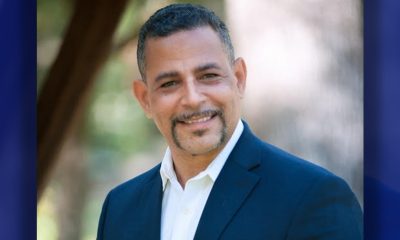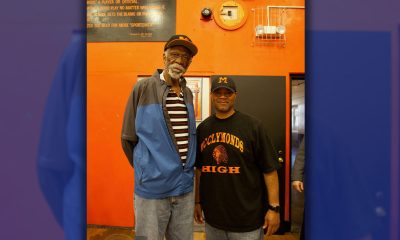Crime
Obama Bans Some Military-style Equipment Provided to Police
By Associated Press
In a surprise announcement coming nine months after police in riot gear dispelled racially charged protests, President Barack Obama is banning the federal government from providing some military-style equipment to local departments and putting stricter controls on other weapons and gear distributed to law enforcement.
The announcement comes after the White House suggested last year that Obama would maintain programs that provide the type of military-style equipment used to respond to demonstrators last summer in Ferguson, Missouri, because of their broader contribution to public safety. But an interagency group found “substantial risk of misusing or overusing” items like tracked armored vehicles, high-powered firearms and camouflage could undermine trust in police.
With scrutiny on police only increasing in the ensuing months after a series of highly publicized deaths of black suspects nationwide, Obama also is unveiling the final report of a task force he created to help build confidence between police and minority communities in particular. The announcements come as Obama is visiting Camden, New Jersey, one of the country’s most violent and poorest cities.
Obama plans to visit Camden police headquarters before heading to a community center to meet with youth and law enforcement and give a speech. “I’ll highlight steps all cities can take to maintain trust between the brave law enforcement officers who put their lives on the line, and the communities they’re sworn to serve and protect,” Obama said in his weekly address out Saturday.
In previewing the president’s trip, the White House said that effective immediately, the federal government will no longer fund or provide armored vehicles that run on a tracked system instead of wheels, weaponized aircraft or vehicles, firearms or ammunition of .50-caliber or higher, grenade launchers, bayonets or camouflage uniforms. The federal government also is exploring ways to recall prohibited equipment already distributed.
In addition, a longer list of equipment the federal government provides will come under tighter control, including wheeled armored vehicles like Humvees, manned aircraft, drones, specialized firearms, explosives, battering rams and riot batons, helmets and shields. Starting in October, police will have to get approval from their city council, mayor or some other local governing body to obtain it, provide a persuasive explanation of why it is needed and have more training and data collection on the use of the equipment.
The issue of police militarization rose to prominence last year after a white police officer in Ferguson fatally shot unarmed black 18-year-old Michael Brown, sparking protests.
Critics questioned why police in full body armor with armored trucks responded to dispel demonstrators, and Obama seemed to sympathize when ordering a review of the programs that provide the equipment.
“There is a big difference between our military and our local law enforcement and we don’t want those lines blurred,” Obama last in August.
But he did not announce a ban in December with the publication of the review, which showed five federal agencies spent $18 billion on programs that provided equipment including 92,442 small arms, 44,275 night-vision devices, 5,235 Humvees, 617 mine-resistant vehicles and 616 aircraft.
At the time, the White House defended the programs as proving to be useful in many cases, such as the response to the Boston Marathon bombing. Instead of repealing the programs, Obama issued an executive order that required federal agencies that run the programs to consult with law enforcement and civil rights and civil liberties organizations to recommend changes that make sure they are accountable and transparent.
That working group said in a report out Monday that it developed the list of newly banned equipment because “the substantial risk of misusing or overusing these items, which are seen as militaristic in nature, could significantly undermine community trust and may encourage tactics and behaviors that are inconsistent with the premise of civilian law enforcement.”
The separate report from the 21st Century Policing task force has a long list of recommendations to improve trust in police, including encouraging more transparency about interactions with the public. The White House said 21 police agencies nationwide, including Camden and nearby Philadelphia, have agreed to start putting out never-before released data on citizen interactions like use of force, stops, citations and officer-involved shootings.
The administration also is launching an online toolkit to encourage the use of body cameras to record police interactions. And the Justice Department is giving $163 million in grants to incentivize police departments to adopt the report’s recommendations.
Activism
Learning Life’s Lessons
Since his release over five years ago, Richard has committed himself to making a difference, particularly by reaching out to women and families who lack the presence of a father or husband. He knows he cannot undo the years lost behind prison walls, but he is determined to use his past to build a better future for others. His story mirrors that of many who have walked a similar path. Yet, it remains uniquely his own – a testament to the power of change, resilience, and the belief that even from tragedy, something good can emerge.

“California’s three-strike laws gave me 2 life sentences for drug possession. After serving 28 years, mostly in solitary confinement, I am free to lead a movement to get the formerly incarcerated to give back.”
By Richard Johnson
I have written this book in hopes of being able to help others from not traveling down the path that leads to imprisonment or a cemetery. At the very beginning of writing this book, it began as a message to my son Fati Yero Gaidi, who was only two years old at the time that I was given two life sentences in prison for drug possession, under the newly implemented three-strikes-you-out law. The more that I wrote, the book began to evolve beyond its intended purpose for my son; it became something that any and everyone could utilize on their separate journeys through life challenges that we encounter. The book helped me put my thoughts, reasoning, perceptions, and views on display, while opening doors that, for the most part, were closed. The book can be purchased via Amazon. Learning life lessons.
About the Author
By Post staff
Richard “Razor” Johnson, 74, is a man whose life journey is marked by hard-earned wisdom, redemption, and an unshakable commitment to guiding the next generation. Once sentenced to life under California’s Three Strikes Law, he was released through what he calls nothing short of divine intervention. His time behind bars, particularly in Pelican Bay State Prison, gave him a new raw and unfiltered understanding of life’s hardest truths.
With the realization that time is precious and the future is shaped by the lessons we learn, Richard writes with urgency and purpose. His book—a 300-page labor of love—is dedicated to young men who may not have a father to teach them the meaning of life’s most important words. Through definitions filled with wisdom, experience, and deep personal insight, he offers direction to those who find themselves lost, just as he once was.
Since his release over five years ago, Richard has committed himself to making a difference, particularly by reaching out to women and families who lack the presence of a father or husband. He knows he cannot undo the years lost behind prison walls, but he is determined to use his past to build a better future for others. His story mirrors that of many who have walked a similar path. Yet, it remains uniquely his own – a testament to the power of change, resilience, and the belief that even from tragedy, something good can emerge.
His words are not just lessons; they are a call to action. He hopes that by investing in young minds with wisdom and insight, they will be better equipped to navigate life’s trials, learn from their mistakes, and find their path to success. Richard “Razor” Johnson writes not just to be heard, but to help – because he knows firsthand that sometimes guidance can make all the difference.
Post publishers Paul and Gay Cobb visited Johnson in San Quentin and attended his graduation while he was in prison. He became a columnist with the Post News Group and has continued his advocacy for the formerly incarcerated by urging them to “give something back”. Johnson says he will be speaking at prisons, colleges, and media outlets to help organize voter registration and community service projects.
Activism
Oakland Post: Week of June 11 – 17, 2025
The printed Weekly Edition of the Oakland Post: Week of June 11 – 17, 2025

To enlarge your view of this issue, use the slider, magnifying glass icon or full page icon in the lower right corner of the browser window.
Activism
Oakland Post: Week of June 4 – 10, 2025
The printed Weekly Edition of the Oakland Post: Week of June 4-10, 2025

To enlarge your view of this issue, use the slider, magnifying glass icon or full page icon in the lower right corner of the browser window.
-

 Activism4 weeks ago
Activism4 weeks agoOPINION: Your Voice and Vote Impact the Quality of Your Health Care
-

 Bo Tefu4 weeks ago
Bo Tefu4 weeks agoGov. Newsom Highlights Record-Breaking Tourism Revenue, Warns of Economic Threats from Federal Policies
-

 Bay Area4 weeks ago
Bay Area4 weeks agoChevron Richmond Installs Baker Hughes Flare.IQ, Real-time Flare Monitoring, Control and Reduction System
-

 Activism3 weeks ago
Activism3 weeks agoOakland Post: Week of May 21 – 27, 2025
-

 Activism4 weeks ago
Activism4 weeks agoNewsom, Pelosi Welcome Election of First American Pope; Call for Unity and Compassion
-

 Activism4 weeks ago
Activism4 weeks agoOPINION: Supreme Court Case Highlights Clash Between Parental Rights and Progressive Indoctrination
-

 Activism4 weeks ago
Activism4 weeks agoCalifornia Observes Third Annual Black Health Advocacy Week
-

 Business4 weeks ago
Business4 weeks agoStudent Loan Collections Have Resumed: Here’s What You Need to Know
























































